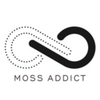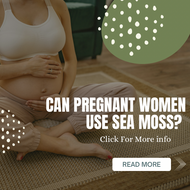Pregnant, Breastfeeding & Children
Posted by Owner on Jun 30th 2023
Pregnant:
Pregnant women should exercise caution and consult with their healthcare provider before consuming sea moss or any new food or supplement during pregnancy. While sea moss can provide various nutrients beneficial for health, it's essential to consider individual circumstances and seek professional advice.
Here are a few points to keep in mind:
- Nutritional Benefits: Sea moss is rich in vitamins, minerals, and antioxidants that can be beneficial for overall health. However, pregnant women have specific nutritional needs, and it's important to ensure that these needs are met through a balanced and varied diet.
- lodine Content: Sea moss is known to contain iodine, an essential mineral important for thyroid function. Adequate iodine intake is crucial during pregnancy for the development of the baby's brain and nervous system. However, excessive iodine intake can also be a concern. It's important to discuss iodine intake with your healthcare provider to ensure you're meeting the recommended levels without exceeding them.
- Safety and Purity: It's crucial to ensure that the sea moss consumed during pregnancy is safe, pure, and free from contaminants. Proper washing and preparation techniques should be followed to minimize any potential risks.
- Potential Allergies or Sensitivities: Pregnant women may have specific allergies or sensitivities, and some individuals may have allergies to seafood or iodine. If you have any known allergies or sensitivities, it's important to discuss them with your healthcare provider before consuming sea moss.
- Individual Recommendations: Each pregnancy is unique, and individual factors such as medical history, dietary requirements, and potential complications should be considered. Your healthcare provider will be able to provide personalized guidance and recommendations regarding the consumption of sea moss during pregnancy.
Always consult with your healthcare provider before making any dietary changes or introducing new foods or supplements during pregnancy. They can provide specific recommendations based on your individual circumstances and help ensure a safe and healthy pregnancy for both you and your baby.
Breastfeeding:
When it comes to consuming sea moss while breastfeeding, it's important to exercise caution and consult with a healthcare professional or lactation specialist before making any dietary changes.
While sea moss can provide various nutrients that may be beneficial, individual circumstances and considerations need to be taken into account.
Here are some points to keep in mind:
- Nutritional Needs: Breastfeeding mothers have specific nutritional needs to support both their own health and the production of breast milk. It's crucial to ensure that these needs are met through a well-balanced diet that includes a variety of nutrient-rich foods.
- lodine Content: Sea moss contains iodine, which is an essential mineral needed for thyroid function. Adequate iodine intake is important for breastfeeding mothers, as it supports the development and growth of the baby. However, excessive iodine intake can be a concern. Your healthcare provider can guide you on the appropriate iodine intake based on your specific needs.
- Safety and Purity: Ensuring that the sea moss you consume while breastfeeding is safe, pure, and free from contaminants is crucial. Follow proper washing and preparation techniques to minimize any potential risks.
- Potential Allergies or Sensitivities: Some individuals may have allergies or sensitivities to seafood or iodine. If you have known allergies or sensitivities, it's important to discuss them with your healthcare provider before incorporating sea moss into your diet while breastfeeding.
- Individual Recommendations: Each breastfeeding journey is unique, and individual factors such as medical history, dietary requirements, and potential complications should be taken into consideration. Your healthcare provider or a lactation specialist will be able to provide personalized guidance and recommendations regarding the consumption of sea moss while breastfeeding.
It's always best to consult with a healthcare professional or a lactation specialist who can provide specific advice based on your individual circumstances. They can help you make informed decisions regarding your diet and ensure that it supports your health and the health of your baby during the breastfeeding period.
Children:
Sea moss can be consumed by children, but it's essential to exercise caution and seek guidance
from a healthcare professional or pediatrician before introducing it into their diet. Children have
specific nutritional needs, and individual factors should be considered before incorporating any new
food into their routine.
Here are some important points to consider:
- Age: The age of the child is an important factor to consider. Sea moss may not be suitable for
infants or very young children who are still developing their digestive systems. It's best to consult
with a healthcare professional to determine if sea moss is appropriate for your child's age group. - Allergies and Sensitivities: Sea moss is derived from seaweed, and some children may have
allergies or sensitivities to seafood or iodine. If your child has known allergies or sensitivities, it's
crucial to discuss with a healthcare professional before introducing sea moss. - Preparation and Safety: When incorporating sea moss into a child's diet, it's important to ensure
proper preparation and safety. Sea moss should be thoroughly washed and soaked to remove any
potential impurities or contaminants. It should also be prepared in a safe and hygienic manner. - Small Portions: Start with small portions when introducing sea moss to a child's diet and observe
for any adverse reactions. As with any new food, it's important to monitor how the child responds
to sea moss and adjust accordingly.
Remember, the guidance of a healthcare professional is crucial when considering sea moss or any
new food for children. They can provide specific recomendations based on your child's individual
needs, allergies, and overall health.

